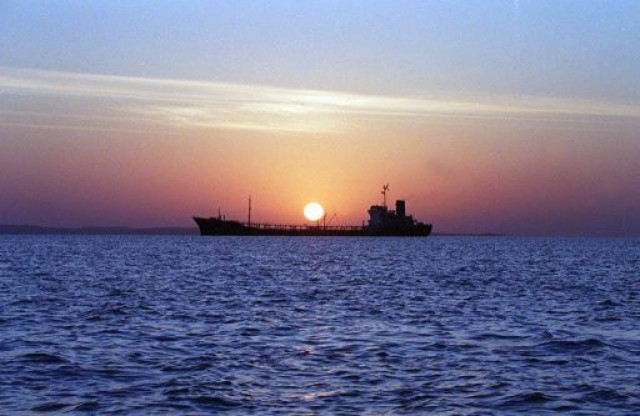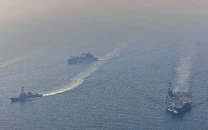Iran dismisses new US sanctions with threats of its own
Iran threatens to embargo crude oil supplies to Europe ahead of a European embargo on Iran.

Lawmakers in Tehran vowed to ban crude exports to European countries even before an EU oil embargo takes effect.
The US sanctions, targeting Iran's central bank and giving US banks new powers to freeze Iranian government assets, were the latest in a tightening web of international measures aimed at forcing the Islamic Republic to scrap sensitive nuclear work.
"It is an antagonistic move, psychological warfare which has no impact... There is nothing new, it has been going on for over 30 years," Iranian Foreign Ministry spokesman Ramin Mehmanparast said, referring to three decades of US-Iranian hostility.
Rice exporters said Iranian buyers had defaulted on payment for 200,000 tonnes of rice from their top supplier India in another sign that Western financial sanctions are disrupting trade, even in one of Iran's food staples.
While a plunging rial has made forward purchases costlier, the sanctions are hampering Iranian traders who have used Dubai-based middlemen to keep paying Indian rice suppliers.
Grain ships are docked outside Iranian ports, traders are not booking fresh cargoes and exports of staples to Iran such as maize are falling due to problems collecting payment from buyers. Maize is used widely to feed livestock and shortages, when they work their way through, could force farmers into stress slaughter.
Tension with the West rose last month when the United States and the European Union targeted Iranian oil exports in their efforts to halt Tehran's suspected quest for an atomic bomb.
Mehmanparast said the pressure would not deter Iran from pursuing a nuclear program it says has only peaceful purposes. "Our history has shown that sanctions, which are totally illogical, have accelerated our nation's progress," he added.
Reprisal Actions
Stung by US President Barack Obama's latest financial jab, Iranian MPs promised to speed passage of a bill to oblige the government to ban oil exports to some EU states well before the 25-nation bloc phases in its own embargo in July.
"The draft bill has been almost finalized. It will oblige the government to immediately cut oil exports to the EU. The bill also will ban import of any goods from the EU," lawmaker Parviz Sarvari told Iran's semi-official Fars news agency.
Washington and its allies have been cranking up pressure on Iran to cut off the government's access to capital and oil revenues with the goal of pushing Tehran back into negotiations to resolve the nuclear stand-off through diplomacy.
Mehmanparast said Iran would soon write to EU foreign policy chief Catherine Ashton about resuming talks with big powers, although he added that its nuclear rights were "not negotiable."
The last talks in January 2010 failed because of Iran's refusal to halt its sensitive uranium enrichment work, as demanded by the UN Security Council and six world powers.
Washington and Israel have not ruled out military action if diplomacy fails to resolve Iran's nuclear row.
Iran has warned of a "painful" answer, saying it would hit Israel and US bases in the Gulf as well as block the vital Gulf oil shipping route through the Strait of Hormuz.
The measures authorized by Obama on Sunday are likely to slow Iran's trade with Asia by making payments more difficult, traders said on Tuesday, although the more determined can still find a route through Middle Eastern intermediaries.
US sanctions now encompass all Iran's financial institutions and oblige financial bodies doing business in the United States to block and freeze transactions with a suspected link to Iran. Previous sanctions had only required American banks to reject those transactions.
Trade Headaches
Asian importers of Iranian crude, fuel oil and iron ore will find the measures snarl payment, already often routed via Middle East middlemen. Iran will have to take more payment in illiquid currencies, raising costs and piling pressure on its rial.
On January 26, Iran announced an 8 percent devaluation of the rial and said it would enforce a single exchange rate, aiming to stamp out a black market where the dollar's value has soared due to fears over new sanctions imposed by the West.
"Iranian cargoes I can get, that's not a problem. But how to pay is a problem," said an iron ore trader in New Delhi.
Vijay Setia, president of the All India Rice Exporters' Association, said the Iranian default had prompted him to ask the Indian government to step in. "It is a serious issue and we do not rule out further payment defaults by Iran," he said.
Setia said India should not send any more rice to Iran on credit, adding suppliers such as those in Thailand, Vietnam and Pakistan had already stopped doing so.
Iranian fuel oil shipments through Singapore are slowing as sanction worries deter traders, while some Iranian iron ore exporters are accelerating loadings to China for fear of even more difficulty procuring ships and payment later this month.
Iran's economy is already so weakened that its oil exports are more valuable than its imports of food and consumer goods, making it difficult to offset its exports by paying for imports.



















COMMENTS
Comments are moderated and generally will be posted if they are on-topic and not abusive.
For more information, please see our Comments FAQ